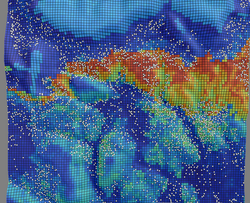Machine Learning methods for automated soil mapping
Pre-conference training course
We are pleased to announce a pre-conference training course on "Machine Learning methods for automated soil mapping".
The course is held Monday 27 June from 9:00 - 15:00 and lecturer is: Tom Hengl, senior researcher from ISRIC - World Soil Information.
Venue is Richard Mortensen room, Fredrik Nielsens Vej 4, 8000 Aarhus C.
It is free to participate in the pre-conference training course but registration is needed via this link.
There is a max. of 60 participants for the pre-conference course.
No meals etc. are included, but there is a canteen nearby.
Overview
There is an increasing interest in using Machine Learning techniques for the purpose of generating spatial predictions, fitting pedo-transfer functions and soil data mining in general. Machine Learning such as random forests, neural networks, Support Vector Machines and similar, have already shown predictive potential for soil mapping purpose, but how to integrate and apply these techniques for an operational generation of soil property and class maps? This workshops will try to convince that, with some computational optimization and careful coding, Open Source software such as ranger (A Fast Implementation of Random Forests), xgboost (Extreme Gradient Boosting), h2o (open-source software for big-data analysis), and OSGeo tools can be efficiently combined to generate best unbiased predictions of common soil properties and classes, even within limited computing infrastructure (desktop PCs).
Who is it for?
This workshops aims at soil data analysts already familiar with using predictive / statistical techniques for the purpose of generating soil data products. The following checklist should help you decide whether this workshop is for you:
-
Is your objective to automate model fitting and spatial prediction?
-
Do you work with large rasters / are you experiencing memory and computational problems with using R?
-
Are you interested in running uncertainty assessment for maps generated using machine learning?
Highlights
During the workshop we will run series of exercises / data processing demonstrations:
- Spatial prediction of soil organic carbon in 3D using Machine Learning (edgeroi data set);
- Uncertainty assessment of soil organic carbon predictions generated using Machine Learning (the quantregForest package; edgeroi data set)
- Spatial prediction of soil classes using ensemble methods (weighted average between: randomForest,e1071::svm and nnet::multinom);
- Fitting pedo-transfer functions and visualization of correlation plots using randomForestSRC and ggRandomForests packages (using MLA to fit a pedo-transfer function for bulk density);
Participants will also receive all R code and a copy of all inputs and outputs on a USB stick to allow for simultaneous comparison.


